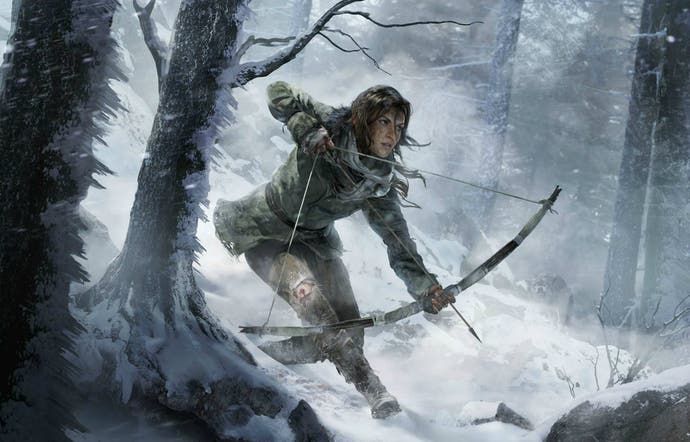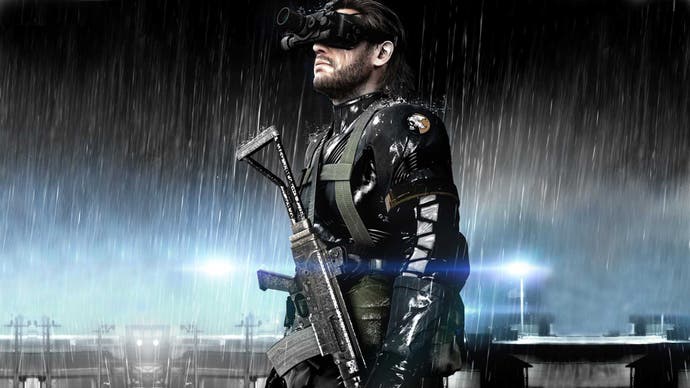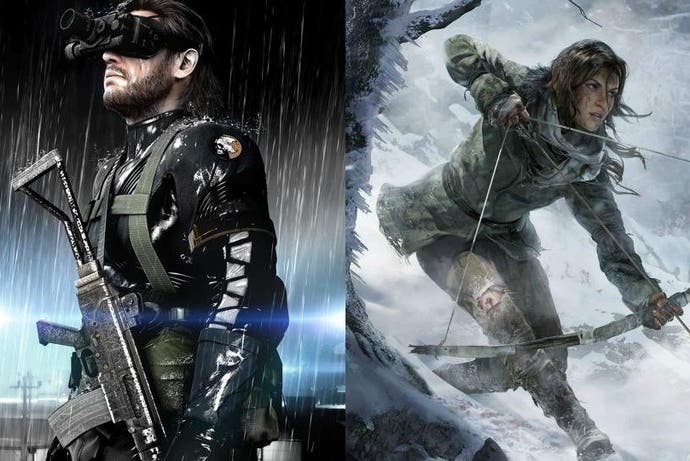Snake moves with the times, Lara doesn't
The Tomb Raider deal dominated headlines, but Metal Gear's move onto Steam is the true harbinger.
Lara Croft and Solid (or Naked, or whatever) Snake: you can't rival these two rock stars of gaming for their iconic power. And though Snake's roots go back a little further, they both have a deep, emblematic connection with the fifth generation of game consoles, the so-called PlayStation generation - those heady days of the late 90s when gaming burst out of teen bedrooms, into 3D and into a cinematic world of high adventure and sexy intrigue.
This week at Gamescom, both these icons made significant strategic moves on the big-business battlefield of gaming platforms. Microsoft announced that the next instalment of Lara's famous series, Rise of the Tomb Raider, would be exclusive to Xbox - for a while, at least. A day later, Konami revealed that Metal Gear Solid 5 would be released on Steam, bringing Snake to Valve's platform (if not PC) for the first time.
The first of these announcements was met with a storm of headlines, controversy, comment and community anger; the second a collective response that you could summarise as "well, duh." But let's not be blinded by the drama. The Tomb Raider deal is an anomaly, a freak of circumstance. It's the Metal Gear announcement that's a true sign of the times.
This is not to say that all the Tomb Raider fans who've been enjoying the series on PlayStation and PC since its very first release in 1996 are wrong to be upset or lack perspective. Exclusivity deals with third-party publishers have long been a key weapon in a platform-holder's arsenal - just think of Final Fantasy's decisive defection from Nintendo to Sony - and naturally give rise to frustration and divided loyalties among fans. Even so, I can't think of another occasion when a series enjoying both Tomb Raider's high profile and its long-standing platform agnosticism has been used in this way. Tomb Raider has always been a multi-platform game; the majority of gamers have always had access to it.

Even if it's only for six months, denial of that access is bound to feel like a betrayal. Doubly so when it's swimming against the economic tide of today's games market, where there's no single dominant platform, big-budget releases simply cannot afford to restrict the size of their potential audience, and most exclusivity deals have been whittled down to a few bonus items or a month's head start on downloadable expansions.
It's not just hurtful for gamers, it doesn't seem like good business. How on earth did this happen? As it happens, the circumstances of the Tomb Raider deal are almost unique, because it's a deal born of desperation - on not one but two sides.
Microsoft finds Xbox One lagging so far behind PS4 in sales that it's not prepared to entrust the 2015 holiday season to a fair fight between the first-party big hitters - Sony's Uncharted 4 and its own Halo 5. Furthermore, unlike its rival, it has pockets deep enough to fund this sort of aggressive, acquisitive move. Now, this situation might well persist; so might Microsoft's willingness to try to buy its way out of trouble. But will it find another willing seller?
Because what was happening across the other side of the conference-room table was surely just as decisive in this deal. Years of financial and structural mismanagement at Square Enix, of hubris and unrealistic expectations at the highest levels, have led the publisher to this pass. As its borderline ludicrous sales targets for last year's Tomb Raider reboot revealed, the company is simply not match-fit for the high-stakes game of mega-budget game releases. It needs help - with marketing especially. That is where Microsoft comes in. We'll likely never know the financial ins and outs of the deal or whether it includes any actual development funding, but I'd be willing to bet that the (considerably larger) cost of and responsibility for a massive global PR and advertising campaign now rest entirely on the shoulders of the Redmond giant.
Would Activision Blizzard, EA, Ubisoft or Take-Two take such a deal for one of their precious franchises? Not a hope. Especially not since they can secure something approaching it for an early release of Call of Duty DLC or some exclusive FIFA Ultimate Team content. That Square Enix had to hand over the keys to the whole game, even on a lease basis, only shows how strategically weak its position must have been.

Is there another publisher, in possession of as treasured a franchise, that could find itself diminished and desperate for help in this way? The only one I can think of is Capcom, with Resident Evil. Even then, I'd bet against it.
Apart from anything else, Capcom will have Konami's example to study. On the face of it, there's little to the announcement that Metal Gear Solid 5: The Phantom Pain - along with its Ground Zeroes prologue - will be released on Steam. We knew that the game's development was PC-based and that a PC version was in the works alongside the console releases. Spin-off Metal Gear Rising had already popped the series' cherry on Steam. In the wider industry, aside from holdout EA with its Origin platform (and a few powerful PC developers with the resources and motivation to develop bespoke networks, like Blizzard and Riot), there seems to be a general acceptance that Valve now owns the distribution of PC games outright.
So, nothing to see here; Konami is just letting Metal Gear Solid go with the inexorable flow. It was obvious and inevitable. Well, exactly. The significance of this announcement is just that, its inevitability. Steam is so well-established as the third platform that releasing multi-platform games on it is a no-brainer for any independent publisher. (And not only the independent ones; even Microsoft Studios releases games there.) Steam rises; its immense reach and commercial clout expand quietly and inexorably, with minimal corporate interference, while Microsoft and Sony trade expensive punches with each other. They ignore it at their considerable peril.
It's not that Steam will win a platform war. It's that - unlike Xbox - it's not trying to. Valve's position is that open systems offering access to all kinds of games, competing on features and ease of use rather than exclusive content acquisition, is the natural order of things. The market supports that view. Konami knows it; Kojima knows it; Snake follows. Lara's been led astray. Far from signifying a return to the bad old days, the Tomb Raider deal is just the last, ugly gasp of a dying era.

